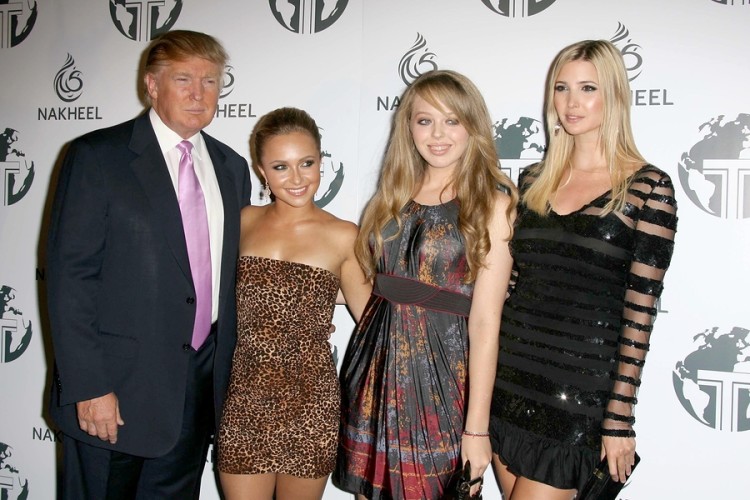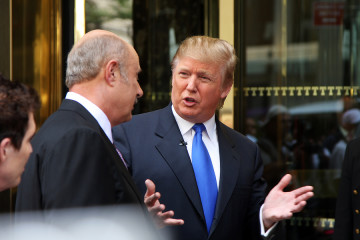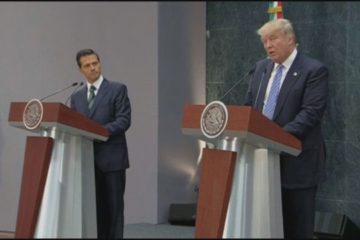Trump Leads Republicans in Race to the Bottom: Margaret Carlson

©2015 Bloomberg View
NS9MQF6KLVR8
(Bloomberg View) — In the not-so-distant past — 2012, to be exact — candidates lived and died by the money primary. How much you could raise was a measure of your worth as a candidate and an indication of how long you could stay in the race.
Trailing behind the money primary was the consultant primary — that is, who hired whom among the Washington strategists with the biggest reputations.
Those competitions are so yesterday — for Republicans, anyway. A new primary is hogging the spotlight: the debate primary. Republican candidates are consumed by making it into the first of the Big Shows on Aug. 6, saying and doing ever more provocative things to make the top 10. Like Chauncey Gardiner, being there is everything.
The debate primary is very different from the money primary, in which wealthy donors would gather in mahogany- paneled rooms, oceanfront mansions or plush restaurants to hear the pitches of aspiring candidates. They still do, of course, and probably always will, but in the debate primary it’s the candidates who are waiting to hear from the powerful TV executives: At 5 p.m. Aug. 4, Fox News, host of the first debate, will declare the 10 candidates who will appear in prime time by averaging five as-yet-unnamed national polls.
A major difference between the old primaries and the debate primary is that what was said in those paneled rooms mostly stayed in those rooms — with rare exceptions, such as Mitt Romney’s 2012 “47 percent” gaffe or Barack Obama’s mumblings about people who cling to their guns and religions, both intemperate, ill-considered remarks made by smart men who momentarily forgot that there is no longer any such thing as a private conversation.
In the debate primary, candidates now make all their intemperate, ill-considered remarks in public. Gone is Ronald Reagan’s 11th Commandment to not speak ill of a fellow Republican. On Friday, Texas Senator Ted Cruz called Majority Leader Mitch McConnell a liar on the Senate floor for allowing a proposal to keep the Export-Import Bank alive come to the floor. So much for the Gipper, loyalty or common courtesy.
That’s an example of the extreme measures it takes to divert the news media’s intense focus on Donald Trump to a candidate polling below him. According to the AP, Trump has gotten more coverage on network news since June than all the other candidates combined, with 114 minutes for him and a mere 15 minutes for runner-up Jeb Bush.
Trump is an attention-seeking missile bolstered by a sleek jet, a model wife, putative billions and no shame. For the candidates who hold office — with the exception of a few natural loudmouths like Cruz and New Jersey Governor Chris Christie, who admonished a voter not to lie about his record last weekend — it is hard to match the Donald, a private citizen with no worries about having to retain the credibility to govern.
The other candidates are being drawn to Trump’s act. After his speech in which he said many Mexican immigrants were rapists, most of the candidates stood down. By the time he accused Senator John McCain of not being a war hero, candidates stood up, either because they were genuinely outraged or because they had noticed that Trump was way ahead. When South Carolina Senator Lindsey Graham insulted Trump, Trump swung back by revealing Graham had called him “begging” for a good reference for “Fox & Friends,” and gave out his private phone number.
What a gift. Graham quickly produced a video in which he swung a golf club and a sword as part of a successful effort to smash his phone. At the bottom of the polls, Graham got to dominate the airwaves for a full day.
A fundraiser for Wisconsin Governor Scott Walker sent out a letter on his behalf referring to Trump as “DumbDumb.” Trump asked for an apology from Walker, which was not forthcoming. So Trump went on a tear about what a “disaster” Wisconsin’s economy is, proving you don’t want to go mano a mano with him if you have anything to hide.
Like Walker, Jeb Bush has secured a debate spot, but finds himself trailing Trump (12 percent to Trump’s 24 percent in the latest ABC-Washington Post poll). Bush has gone after Trump like a disappointed parent, saddened by his attack on immigrants and calling for civility and a change in tone. That’s catnip for Trump. Tone? “We need tone,” Trump scoffed Tuesday, going on to blast Bush for his general squishiness. He added, unsurprisingly: “I’m not a fan of Jeb Bush. … Who would you rather have negotiating with China? Trump or Jeb?”
Given Trump’s bellicosity, it’s safer to deflect attention from him without a direct attack. Look at former Arkansas Governor Mike Huckabee, who invoked a Holocaust analogy — a surefire way to make headlines — in denouncing the Iran deal. Of Obama, Huckabee said, “He will take the Israelis and march them to the door of the oven.”
Bingo. Within hours, Huckabee was everywhere, claiming that Jews supported his comments, as well as needling the other candidates to take sides (Cruz, Rick Santorum and, you guessed it, Trump came aboard) and grabbing the attention of the president in Kenya. He called Huckabee’s hyperbole “ridiculous” and “sad.” Seeing through Huckabee’s gambit, Obama added, “Maybe this is just an effort to push Mr. Trump out of the headlines.”
What a win. Huckabee finds himself in a fight with the president covered tit-for-tat by the press, with meat for a new fundraising letter and calls to appear on national TV. After being ignored almost completely since his announcement, for several news cycles, Huckabee pushed Trump out of the headlines.
Expect copycats.
There’s no place for subtlety in trumping Trump. Merely outlining his plans for tax reform wasn’t getting Kentucky Senator Rand Paul anywhere, so he set the tax code aflame. Not quite as incendiary was former Texas Governor Rick Perry’s prescription for not being murdered at the multiplex: Moviegoers should be allowed to carry their own guns into theaters and shoot it out, in their own version of “Gunfight at the O.K. Corral.”
It’s a commentary on voters’ disgust with politics that they’ve embraced Trump as an authentic expression of their boiling anger at the status quo, and other candidates are emulating him. It’s a vicious circle that will take us all down the drain. The more some people hate politics, the more candidates are apt to behave in ways that make us all hate it even more.
This column does not necessarily reflect the opinion of the editorial board or Bloomberg LP and its owners.
To contact the author on this story: Margaret Carlson at mcarlson3@bloomberg.net To contact the editor on this story: Stacey Shick at sshick@bloomberg.net
For more columns from Bloomberg View, visit http://www.bloomberg.com/view







No Comment